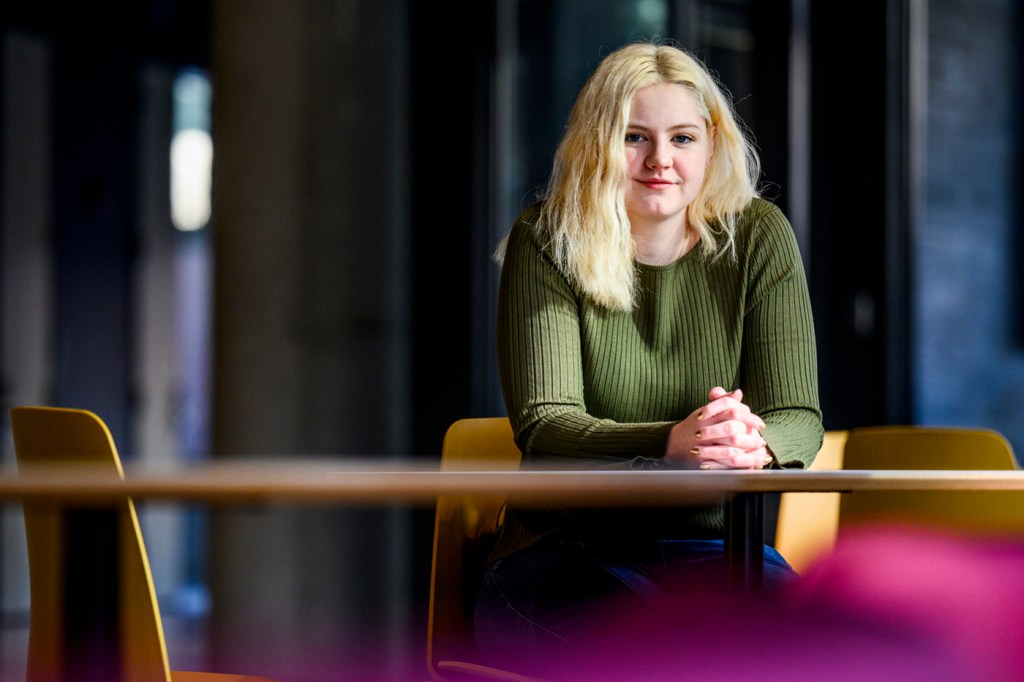How Northeastern international business students solved a small business challenge in Honduras
In Paula Caligiuri’s international business class, a group of students used consulting and cultural skills to help a Honduran small business owner, demonstrating creativity, adaptability and real-world problem-solving.

Sigris Illiana Arriaga Orellana inherited her souvenir shop in Marcala, Honduras, from her mother.
As a small business owner in a rural town of about 15,000 residents, Orellana lacked a system for tracking expenses and monitoring inventory, and she did not speak English.
However, Northeastern University third-year international business students stepped in to help her solve the bookkeeping issues, as well as establish some marketing efforts, resolve property issues and expand her product distribution.
The students consulted for free as part of their class, “Understanding and Managing Cultural Differences,” taught by Paula Caligiuri, a distinguished professor of international business and strategy.
Learning soft skills that are important in international business in Caligiuri’s class and then applying them immediately with consulting clients was incredibly useful, says Johanna Murdock, one of the student consultants.
Working with a real client in Honduras brought a new level of depth to her learning, she says, that she had never experienced before through numerous theoretical consulting case studies.
“This has probably been the most useful experience I’ve had so far to prepare me for actually working internationally,” she says.
“The project was absolutely fantastic,” Murdock says. “We learned so much about how to navigate working with someone in a different culture, and how to be a good consultant for them, and how to come up with solutions that work for them in the stage they’re in and the place they’re in with the resources they have.”
The class emphasizes the importance of cultural context by taking students out of their comfort zone. Students work in teams on virtual consulting projects with clients of Global Brigades, an international nonprofit, from rural and indigenous areas of Honduras or Panama.
“We were able to overcome the language barrier and develop a strong relationship with Sigris in the little time we had,” says Hailey Bourne, a student consultant. “We came in with empathy and humility, as well as excitement and determination, which allowed us to better understand the context of her situation.”

During the COVID-19 pandemic, Caligiuri began partnering with Global Brigades. The relationship has given her students an opportunity to help underserved communities address economic disparities while providing them with invaluable experience.
“This program has had such a profound effect on my students, I started offering it every year as part of this course,” Caligiuri says.
When students are motivated to make a difference, Caligiuri says, they are more willing to try different approaches that they would feel uncomfortable trying otherwise. For example, they might learn some Spanish to connect with a client or make some calls they would otherwise avoid.
“I found the same motivation and growth when I ran similar programs for corporate executives,” she says.
The clients are mostly solopreneurs or small business owners, Caligiuri says, who might not have a computer or basic accounting knowledge. This pushes students to think creatively, beyond the traditional business frameworks and tools they’ve learned in such disciplines as accounting, finance and strategy.
The Northeastern consulting team connected with Orellana via Zoom. Global Brigades also provided a Spanish-speaking liaison to assist during these sessions.
The consultants began by building a relationship with Orellana and learning as much as possible about her business.
The town of Marcala, located along the Lenca Trail, attracts many English-speaking tourists with its indigenous Lenca culture and heritage and renowned high-quality coffee.
Orellana wanted to attract more of such tourists to her shop and create a better system for tracking her income, expenses and inventory.
She also had an unusual request: her shop, constructed from sheet metal, became unbearably hot in the summer. She was looking for a solution to create a more comfortable environment for customers and herself.
Each student on the consulting team gravitated toward tasks aligned with their strengths, Murdock says.
Tessa Galovski designed a beautiful pamphlet about the shop in English and Spanish, which Orellana could distribute in hotels and around town to be discovered by more tourists.
Editor’s Picks
Kai Hamazaki created a Google Sheets template for tracking expenses and inventory.
Isabella Fuleihan, learning that Orellana sold handmade food items, researched legal requirements for selling these products in other stores and supermarkets. She also provided information on natural preservatives to make the items shelf-stable and compliant with local regulations.
Murdock decided to tackle the heat issue. Drawing from her experience repairing homes during summer service camps as a teenager, she initially considered using reflective roof coating but found the idea insufficient after extensive research.
Feeling stuck, she reached out to her high school teacher Marc Therrien, executive director of workcampNE, for advice. Therrien suggested raising one side of the roof to allow hot air to escape, a solution he had seen used in the Dominican Republic.
Remarkably, the nonprofit he had worked with — Casas por Cristo — had a branch in Honduras. Even more astonishing, the local field manager, Darrell Story, lived in Marcala and knew Orellana’s shop.
“Having that very large coincidence made me realize that sometimes you need to leave your anxiety at the door and just try and take the leap in [to make a call],” she says. “I don’t know if there was a more serendipitous way to learn that.”
Murdock connected Orellana to Story, and they are now working on solving the heat problem together.
Bourne prepared the final presentation outlining the team’s recommendations for Orellana.
“I am very confident in Sigris’ abilities going forward,” she says. “I’m grateful for this experience.”











